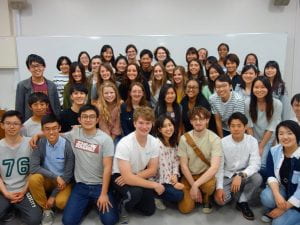My STEP Signature Project was an education abroad trip to Japan via the Public Health Perspectives: Japan program. The trip’s main objective was to show the differences and similarities between the public health systems present in Japan and the US, including trash collection/disposal, disaster response and prevention, elderly care, etc. We were also able to interact with Japanese students and professors at both the University of Tokyo and Azabu University.
I went into this project hoping to learn a little bit more about public health. I came back to the US with a new knowledge of public health, a new appreciation of a different culture, and a new understanding of my own strengths and weaknesses. It’s always easiest to notice the differences in two cultures or systems, but this trip allowed me to notice the similarities between the two systems, as well as to critically examine what aspects of one society could be integrated into the other. On the whole, the program was an incredible opportunity for me to investigate cultural differences first-hand in an open and encouraging environment. Being in such a new environment also helped me notice what I was doing well as well as what I could improve upon, in terms of social/cultural interaction and traveling.
The educational portion of the trip, specifically the numerous field trips to public health facilities, really helped solidify the key differences between the public health systems between the two countries. One of my favorite experiences on the trip was visiting a trash collection and incineration plant outside of the city of Tokyo. We were able to see how the plant collects the trash and mixes the combustible waste; two huge cranes moved in sync to shuffle paper amongst kitchen waste, before moving the mixed trash into the incinerator. I was mesmerized by the process—I was especially excited after hearing that the excess heat from the plant is recycled by way of heating a local community pool, and that the ash from the incineration is used as an ingredient in concrete the city uses when building. The organization required to coordinate a country-wide recycling program that then recycles its own energy and waste astounded me and inspired my own investigation of the trash collection process within the US.
One of the greatest opportunities throughout was the trip was the ability to interact with Japanese university students. These interactions helped me see clear cultural differences on a personal level. It was incredible to be able to invest my curiosity in someone who was in a similar situation but from a completely new perspective. The University of Tokyo students were young people interested in health, like me. And yet, our views of the world, our societal problems, and our ways of interacting with our environment were on two different ends of a spectrum. Being able to talk about these differences in a fun, safe, and comfortable environment was so important to my ability to understand their cultural perspective. These interactions definitely changed how I want to travel in the future: I want to interact personally with locals so that I can better understand the culture I’m investigating.
A big portion of the trip was spent traveling with a large group to pre-determined destinations. However, I discovered a lot about myself in the moments where I traveled by myself or with a smaller group. Having never before traveled abroad without my parents, I was forced to become independent almost immediately upon landing in Japan. It was a quick lesson, but one that made me more confident in my ability to travel by myself and navigate a new environment. It kept me on my toes, as well, where I was constantly making sure of our location and our group dynamic and our time. I learned a lot about my strong points as a traveler and as a group member, and was able to work on my weaknesses (like my shyness around strangers on public transportation, for example).
This trip helped open my eyes to a new field of study, one that ties into my future in medicine richly and deeply. Public health is important to understand from both a social and environmental standpoint, and being able to do so in a new culture helped me clearly differentiate the two perspectives. More than that, however, this trip was a once-in-a-lifetime opportunity for me to experience a new country and culture in a deeply personal way—though I was not a native, my interactions with Japanese students and several helpful assists from translators helped me see the country from a local’s point of view. Without STEP, I wouldn’t have been able to go on this trip. Without this trip, I wouldn’t be as passionate about public health or understanding new cultures as I am today.
Here’s a link to a blog post I made about my time in Japan: http://u.osu.edu/japan/2019/05/29/japan-a-lesson-in-balance/
Here’s a link to some Youtube videos I made about the trip:



















